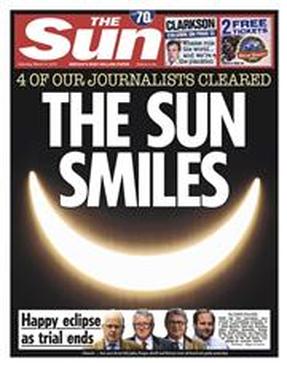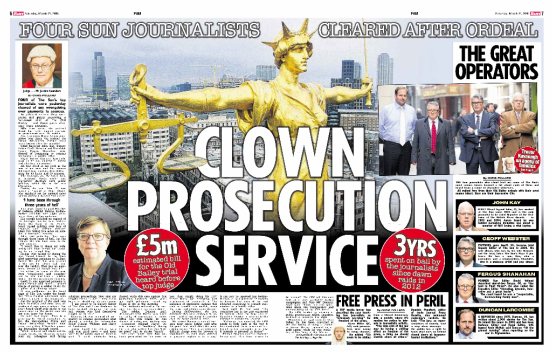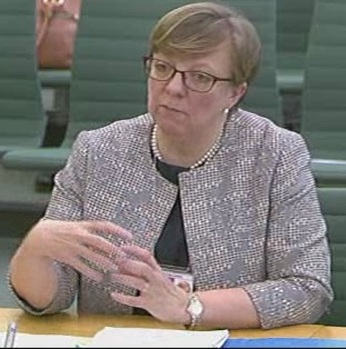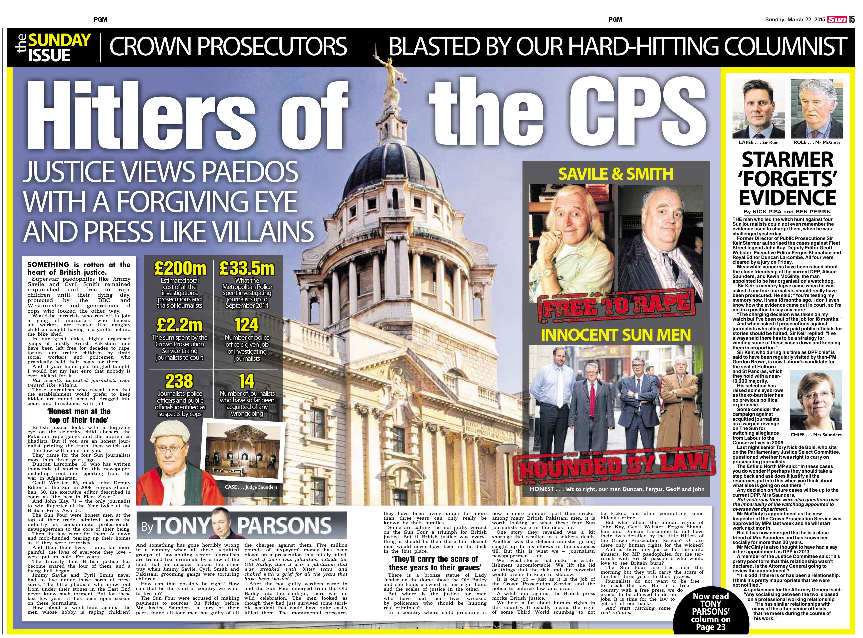These blokes had a miserable time, but torture? No. That's Syria, not EssexMonday 23 March, 2015
It's a brilliant front page. The Sun at its lateral-thinking best. And the air of celebration is understandable. Four men who were arrested more than three years ago and put on trial for doing what they thought were their jobs had been cleared. John Kay, Duncan Larcombe, Fergus Shanahan and Geoff Webster were among 64 journalists arrested after the phone-hacking scandal blew open in 2011. They were held not for intercepting voicemails, but under one of handful of spin-off police investigations - in this case for suspected illegal payments to public officials. Over a decade or so, Kay had paid Bettina Jordan-Barber, an MoD strategist, £100,000 for tips on stories as diverse as soldier's inadequate kit, bullying, and the antics of a "nookie-mad colonel". Shanahan and Webster were in the dock for authorising some of the payments. Larcombe was there for paying former Sandhurst instructor John Hardy £23,000 for tales about Princes Harry and William. Hardy and his wife Claire, who were tried with the journalists, were also cleared of misconduct in a public office. Unsurprisingly, the Sun makes hay with the verdicts, Its staff had been through "three years of hell", their families had been through a "terrible ordeal". Much is made of the cost to the public purse of the investigation and prosecutions, the chairman of the home affairs select committee says the CPS needs to think about how it will proceed in future, and a media lawyer says that the case was extremely worrying for a free Press. A panel on the right lauds the achievements of the four journalists, including the fact that Kay is the only person to have been named the British Press Awards reporter of the year twice. Coverage of this story was always going to be partisan; the only aspect of the prosecution argument reported is where its counsel was accused of snobbery for describing the Sun as "gutter press" and its stories "smutty". A defence lawyer is meanwhile quoted as saying that the prosecution of journalists was "the hallmark of repressive regimes that seek to restrict free speech, crush the press and silence open debate".
Towards the end of the main story, the Sun notes: "It can now be reported that Jordan-Barber, 42, was jailed for 12 months in January. The mum of two had admitted conspiring to commit misconduct in a public office." And the final par reads: "Meanwhile ex-royal reporter Ryan Sabey, 34, has been convicted at the Old Bailey of using a soldier in Prince Harry's regiment as a paid tipster while he was working at the News of the World." Strangely this quote from John Kay does not appear: "I'm very, very upset that a trusted source of The Sun ended up in jail as a result of betrayal by my own company." Over the page, a full-depth leader attacks the CPS as being "blind to the feebleness of the case", the bail system that put "these innocent journalists" through "three years of hell" as a "national disgrace", and the police for "fishing" for evidence and raiding "our staff at dawn in front of their terrified, tearful families and ransacked their homes as if they were terror suspects". To compound the "torture", the men were held on bail for three years "with the fear of being unjustly imprisoned destroying their sleep and interrupting every waking moment". And while it's lashing out, the leader veers off at the end to say that it doesn't hold out any hope of fair coverage "from that left-wing foghorn the BBC", whose "blatantly biased" TV bulletin had focused on Jordan-Barber rather than the journalists. Alongside is another emotion-filled piece by Trevor Kavanagh denouncing the process that had condemned them to a "living nightmare". The fear of sharing a cell with real criminals in Belmarsh jail haunted their days. It was on their minds the moment they woke and their last thought before falling asleep. I am as thrilled as the next journalist that the four were cleared. Reporters have been paying for tips forever. Should it have occurred to Kay that there was a difference between paying a footballer's wife and an MoD official? Should Larcombe have realised that a Sandhurst instructor was off-limits for a drink when someone who went to the same school as Kate or Cressie was not?
It's not for me to say. But the fact that Rebekah Brooks had publicly told a committee of MPs in 2003 that her paper had paid police officers for tips and suffered no reprisal suggests that there was no great concern about the practice among law enforcement agencies. The Director of Public Prosecutions at that time was Ken Macdonald, who went on to work as an adviser to News Corp for a brief period in 2011. According to Rupert Murdoch, in the tape of his meeting with disgruntled journalists in July 2013, Macdonald knew that payments were made in Fleet Street "and he decided not to go after it because it was all too petty and too complicated". (It's easier now, since the passing of the Bribery Act in 2010, but the current crop of cases pre-date that)
The Milly Dowler story changed everything. Police, Press and politicians responded as one: in panic. The Leveson inquiry was set up to cover the Prime Minister's embarrassment; the News of the World was closed and mountains of emails were handed to police in an effort to prevent the destruction of the entire News Corp edifice; and the police went into overdrive to atone for their scant investigation of earlier hacking allegations. My personal opinion is that the whole reaction was over the top. The police inquiries bred more inquiries, requiring more manpower and more money. And then, of course, came the prosecutions. And for what? So much time and expense on something that most people didn't care about, on practices that had stopped years before. Was that in the public interest? Did it not make sense to concentrate on the big fish and let the civil courts deal with the individual claims? But once that wagon had been pushed over the hill, who could stop it before it reached the bottom? Earlier this month Alison Saunders, the Director of Public Prosecutions, told MPs examining the use of police bail that hers was a "demand-led" organisation. It didn't go looking for cases; it had to make a judgment on what was submitted to it.
Neither do the police go looking for crimes to investigate. But when one is pointed out as publicly as phone hacking was in 2011, they have little choice but to react. And when the chief suspect presents them with millions upon millions of documents, they are sure as damn going to look at some of them. Would the public have been satisfied if no one had gone on trial for hacking Milly Dowler's phone? No. Would it have been fair to prosecute public officials outed by Murdoch's misnamed Management and Standards Committee, while taking no action against the journalists who paid them? No. Was it wrong, then, to prosecute officials for breaching the public trust? Surely not. These are questions that papers demanding an end to the "witch hunt" have chosen not to address. The Telegraph, Times, Mail and Mirror have all joined the Sun in publishing leaders saying "enough is enough". The Guardian, too, contends that that juries have shown an unwillingness to convict journalists for paying public officials. But where exactly should the CPS call a halt? Four men are on trial on similar charges at the moment; should their case be stopped in mid flow? Two more journalists are awaiting trial; should their cases be abandoned? Then there are the retrials. The CPS did seem to show indecent haste in announcing that it would seek a new trial for four Sun journalists on whom a jury could not reach a verdict after a three-month hearing and 49 hours of deliberation over nine days. We obviously cannot be told how this or the other two hung juries were split, so for all we know, anything up to 30 jurors may have thought the defendants guilty. I don't think it is in the public interest to enforce a retrial in a case where the central prosecution argument of a "grand over-arching conspiracy" was rejected at an early stage. I am deeply uncomfortable - whatever Mr Justice Sweeney says - about the decision to give the new hearing not to Judge Marks, who oversaw the original trial, but to Judge Wide, who presided over the only two convictions of journalists for paying officials. I don't think it is in the public interest to put another journalist back on trial over a relatively modest alleged payment to a policeman. But when it comes to the law, it isn't the amount involved that counts, it's the principle - as Chris Huhne knows to his cost. Nor, as a Times reader points out in the comments thread under its latest leader, should prosecutors be swayed by any perceived trend among juries. They should, he writes, follow the evidence. And, as I keep repeating, we should never forget where the evidence came from. It is no coincidence that 23 of the 27 journalists charged under Operation Elveden worked for News International. We should not delude ourselves that the public sees tabloid journalists as guardians of free speech or democracy - even though their work is valid and valuable. Any sympathy for those in the dock from outside our community comes down to the perception that they and their sources have been betrayed to save Murdoch's empire and Rebekah Brooks. That £16m payoff and reports that she is about to rejoin her mentor in America with a new position - and most likely a seven-figure pay package - sticks in many craws. I am personally sorry to hear that Fergus Shanahan, who was a colleague many years ago, has had such a torrid time. Reading the account of his experience in Press Gazette turns the stomach. I feel for the others, too, as fellow journalists, and wouldn't want to be in their shoes for anything. But most people don't care about what happens to journalists and Kavanagh's melodramatic "Christmases, birthdays and anniversaries ruined" language won't make them care. The treatment of those arrested under Operation Elveden - by the police and by their own employer - was wrong. The suspended animation of extended police bail, which traps tens of thousands of people, a disgrace. But, in common with every other reaction since the Dowler story broke, this coverage is hysterical and over the top. Ordeals are what rape victims go through; torture is what hostages in Syria suffer. The hyperbole continued with a double-page essay from Tony Parsons in the Sun on Sunday telling readers that the Sun four would carry the scars of the past three years to their graves:
British justice looks with a forgiving eye on the celebrity child abusers, the Pakistani rape gangs and the apprentice jihadists. But if you are an honest journalist printing the truth, then watch out - the law will come for you 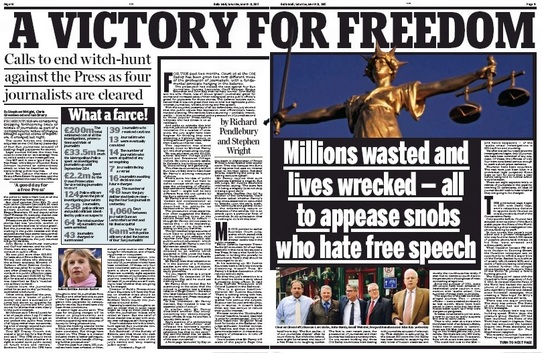
There was more of the same from the Mail on Saturday. Both papers highlighted the £200m cost of the investigations and trials, but did not mention that almost half of that was down to News International's legal team. And both papers took the opportunity to have gratuitous digs at the BBC, the Guardian and Hacked Off - which took its own opportunity to interpret the verdict as further evidence of the need for a new Press regulator.
Bonkers the lot of them. Any fool can see that it is nonsense for the police to spend more money and manpower on investigating journalists who want to buy non-existent pictures of princes in bikinis than they do on pursuing murderers and terrorists. But it is too simplistic to say that journalists are being persecuted by an Establishment that allowed Jimmy Savile and Cyril Smith to go unpunished. How many newspaper stories were published about Savile's criminal activities while he was alive? How many newspapers investigated Smith? If the Establishment failed, then so did the Press. If we believe that the police and CPS approach is wrong - and I do - why are newspapers not reporting every case relating to Elveden, when contempt laws allow, to drive the point home? Bettina Jordan-Barber was a trusted source whose identity was passed to the police by the organisation that had promised to protect her. She was jailed in January (for a conspiracy that the Old Bailey jury decided on Friday hadn't existed) but her case couldn't be reported until the Sun trial was complete. The Sun gave her one paragraph in its "we are the victims" write-through, the Guardian managed 30 words, the Mail 23 and the Times 16. Only the Telegraph made her court case a story in its own right. The conviction of Ryan Sabey, which was also sub-judice until the end of the trial on Friday, was given one paragraph in the Sun and the Times, mentioned in the round-up of convictions and trials in the Guardian, and not reported at all in the Telegraph or Mail. Most newspapers have run panels on the costs of the investigations and the tally of journalists arrested and convicted, but none has included the sources and their fates. Only the Guardian has reported their cases properly - and even then only online. How can that be balanced? How can that give readers the full picture of what is going on? There is a real battle for Press freedom being waged in this country at the moment. We won't win it with selective reporting, wild accusations against rivals and playing the put-upon victim. We will win if we stop talking about how important our job is - and just do it. Further reading: Almost anything by Lisa O'Carroll in Guardian Media James Doleman on the fate of the sources and the burden of proof (And no, SubScribe hasn't turned into a Hacked Off fan or joined the "anti-press left-wing Guardian mafia". These just happen to be the only detailed reports I've found so far. I'd be delighted to see more from other sources.) |
|
Prosecutions
In her evidence to the Home Affairs select committee on March 3, the Director of Public Prosecutions said that in the cases referred to the CPS as a result of all the hacking-related inquiries: 47 led to no further action 25 of those were journalists 36 people had been convicted 10 of whom were journalists 2 people had accepted conditional cautions 1 journalist had accepted a simple caution 15 had been acquitted of all charges 7 of whom were journalists (the verdicts on Friday take this number to 11). Operation Elveden
87 people have so far been arrested under Operation Elveden.
They include 34 journalists, 27 of whom were charged. 1 has pleaded guilty 2 have been convicted 11 have been acquitted 7 face retrials 4 are on trial 2 await trial The sources The fact that trials are still continuing means that it is not possible to report in detail every case, but non-journalists convicted include: Bettina Jordan-Barber, MoD strategist, above.
Sold stories to the Sun for £100,000 over ten years: Guilty plea Jailed for 12 months Judge Saunders: "The offence was particularly serious because of the amount of money and because of the importance and nature of the position that she held in the Ministry of Defence." 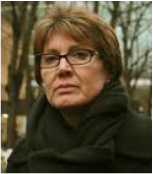
April Casburn, counter-terrorism police officer, above. Offered a hacking investigation story to the News of the World: Not guilty plea Jailed for 15 months Judge Fulford: "A straightforward but troubling case of corruption." PC Alan Tierney Sold stories about John Terry's mother and Ronnie Wood: Guilty plea Jailed for 10 months Judge Fulford: "A disgraceful way for a police officer to act. It is wholly against the public interest for those who hold public office cynically to profit out of the misery or unfortunate circumstances of those for whom they are responsible." Police officer Sold information: Guilty plea Jailed for 2 years Judge Fulford: "Simply motivated by personal profit from the sale of what he, no doubt, believed was a good story". Prison officer Sold information: Not guilty plea Jailed for 3 1/2 years Judge Wide: "Motivated by greed with a seriously aggravating feature". Prison officer's former wife Allowed her bank account to be used for payments from journalists: Not guilty plea Jailed for 30 weeks Judge Wide: “This was effectively money laundering and you took an active part. It was not passive acquiescence.” Prison officer Sold stories about inmate: Guilty plea Jailed for 16 months Judge Fulford: "This country has long prided itself on the integrity of its public officials and cynical acts of betrayal of that high standard have a profoundly corrosive effect. Police sergeant Sold stories about investigations: Guilty plea Jailed for 10 months Judge Fulford: "We are entitled to expect the very highest standards of probity from our police officers," Police constable Offered to sell a story about a colleague: Not guilty plea Jailed for 18 months. Judge Wide: "The sheer number of people who were going to be at least gravely embarrassed and potentially have career damage as a result of your scheming bid makes this a particularly serious case." MoD worker Offered a story to the News of the World Guilty plea Suspended nine-month jail sentence, 200 hours community service Judge Saunders: "I don't regard this as a most serious example of this offending." Former Army private Agreed to get information for paper Cautioned and ordered to pay £40 to military charity CPS lawyer: "Although there was sufficient evidence to prosecute this offence, when considering the public interest it was decided that a conditional caution was an appropriate course of action." Journalists who
went through hell 
James Foley was kidnapped in Syria on Thanksgiving Day in 2012. He was murdered by Isis on August 19, 2014

Stephen Sotloff was kidnapped in Syria in August 2013 and murdered by Isis on September 2, 2014

John Cantlie was kidnapped in Syria in July 2012 and freed a week later. He was snatched again with James Foley the following November and has been used in a series of Isis propaganda videos
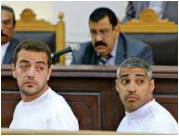
Baher Mohamed and Mohamed Fahmy were arrested in Cairo in 2013 and sentenced to eight years for "manipulating the news". They were released on bail after 412 days in custody, and are now going through a new trial.
Their Australian colleague Peter Greste was arrested on the same day and deported on his 400th day in custody |
How you can be a SubScriber
|
Sign up for email updates (no spam, about one a month)...
|
|
...make a financial contribution
I'd like to subscribe
There will never be a charge for reading SubScribe,
but if you would like to make a donation to keep it going, you can do so in a variety of ways by pressing this button. Thank you. |

